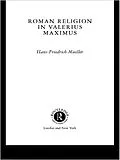DID THE GODS OF ROME CARE ABOUT PERSONAL MORALITY? Valerius Maximus was an indefatigable collector of historical anecdotes illustrating vice and virtue; his Memorable Deeds and Sayings are unparalleled as a source for the opinions of Romans in the early empire on a vast range of subjects. Mueller's study focuses on what Valerius can tell us about contemporary Roman attitudes to religion, attacking several orthodoxies along the way. He argues that Roman religion could be deeply emotional, that it was possible to believe passionately in the divinity of the emperor - even when, like Tiberius, he was still alive - and that Rome's gods and religious rituals had an important role in fostering conventional morality. The study further explores elements of ancient rhetoric, Roman historiography, and Tiberian Rome. The fact that Valerius was a contemporary of Jesus means his work is also valuable in reflecting the attitudes and beliefs of the ruling class to which Christ and his followers were politically subject, and which formed the background to the growth and persecution of Christianity.
Autorentext
HANS-FRIEDRICH MUELLER is Assistant Professor of Classics, University of Florida. In addition to lexicographical contributions to the Thesaurus Linguae Latinae, he has published articles on Greek and Roman historiography and Roman religion
Zusammenfassung
First Published in 2004. Routledge is an imprint of Taylor & Francis, an informa company.
Inhalt
Introduction 1. Juno Valeriana 2. Vesta Mater: Mother Vesta 3. In Iovis Sacrario: In Jupiter's Inner Sanctuary 4. Ritual Vocabulary and Moral Imperatives 5. Sanctitas Morum or the Genreal intersections of Religion and Morality. Conclusion
